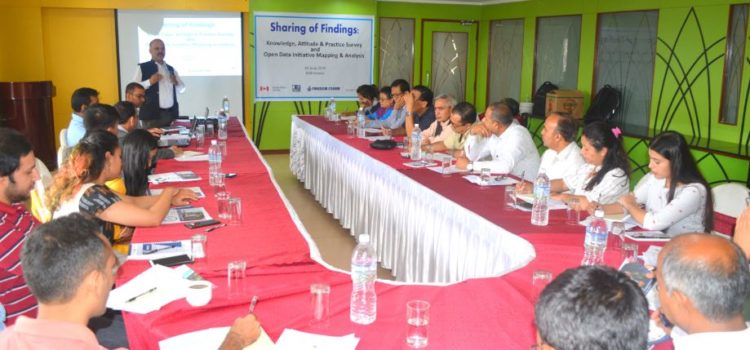Freedom Forum (FF) organized a half day event to share key findings and recommendations of two separate studies entitled ‘Mapping and Analysis of Existing Open Data Initiatives (ODI) at the Federal and Local Government level in Nepal’ and ‘Knowledge, Attitude, and Practice (KAP) Survey of Citizen-State Engagement at Local Level using Technological Interfaces’ in the capital on June 30, 2019.
The studies were undertaken by FF as part of the ‘Sustainable Use of Technology for Public Sector Accountability in Nepal (SUSASAN)’ – a project implemented in 12 local governments of Nepal with funding from Global affairs Canada (GAC).
Centre for International Studies and Cooperation (CECI) is implementing the project in partnership with Freedom Forum, Young Innovation and Centre for Law and Democracy as well as six district-based civil society organization.
The sharing event had brought together total 42 people including a CSOs, researchers, public policy-makers and shapers, experts, media professionals, participants from project districts, representatives from SUSASAN project partners, journalists, thematic experts international development partners.
The sharing event was divided in three sessions – two presentation sessions followed by a question answer session.
Taranath Dahal, Executive Chief, Freedom Forum, emphasized the importance of both the studies to create evidences to engage local governments and citizens for improved public service delivery.
Prakash Poudel, who was in a study team of conducting KAP survey, presented the major findings and recommendations of the KAP survey in the event, He stressed that the KAP survey has identified the areas for citizens, including women and marginalized groups to participate in the decision-making process at local level which is spectacular for future planning and programming.
Pramod Bhattarai, Governance Officer presented the major findings of the ODI mapping and analysis laying emphasis on the need of enhanced awareness among local government, CSOs and citizens for increasing use and re-use of data in demanding governance.
In the sharing program, local governance expert, Krishna Prasad Sapkota appreciated the practice of disclosing information through digital platforms in many local governments.
Sitaram Bhatta, Country Director of CECI Nepal, concluded the event highlighting the importance of the both studies in the work for promoting accountability at local level.
Major feedback from the participations are following:
• Both the studies are important to bridge the gaps between the needs and existing practices at local levels
• Interventions should be carried out to deepen digital literacy so that local people irrespective of education, caste, strengths and class can access to public information and services
• There is pertinent need of developing dis-aggregated data to identify real problems and need for people on data literacy and other literacy
• The samples of the studies should include respondents from all provinces being not limited to province 3 and 7
• The KAP survey and ODI study report should be updated to reflect the changes in context as the studies were undertaken in 2017. It is necessary to carry out next rounds of studies taking the existing reports as the baselines
• The studies should increase more inclusiveness in several aspects
The four-year SUSASAN project is being implemented in Municipal and Rural Municipal government level of six districts: Sindhupalchok, Lalitpur, Kailali, Dadeldhura, Achham and Bajhang of two provinces (3 and 7) along with federal and provincial government.

